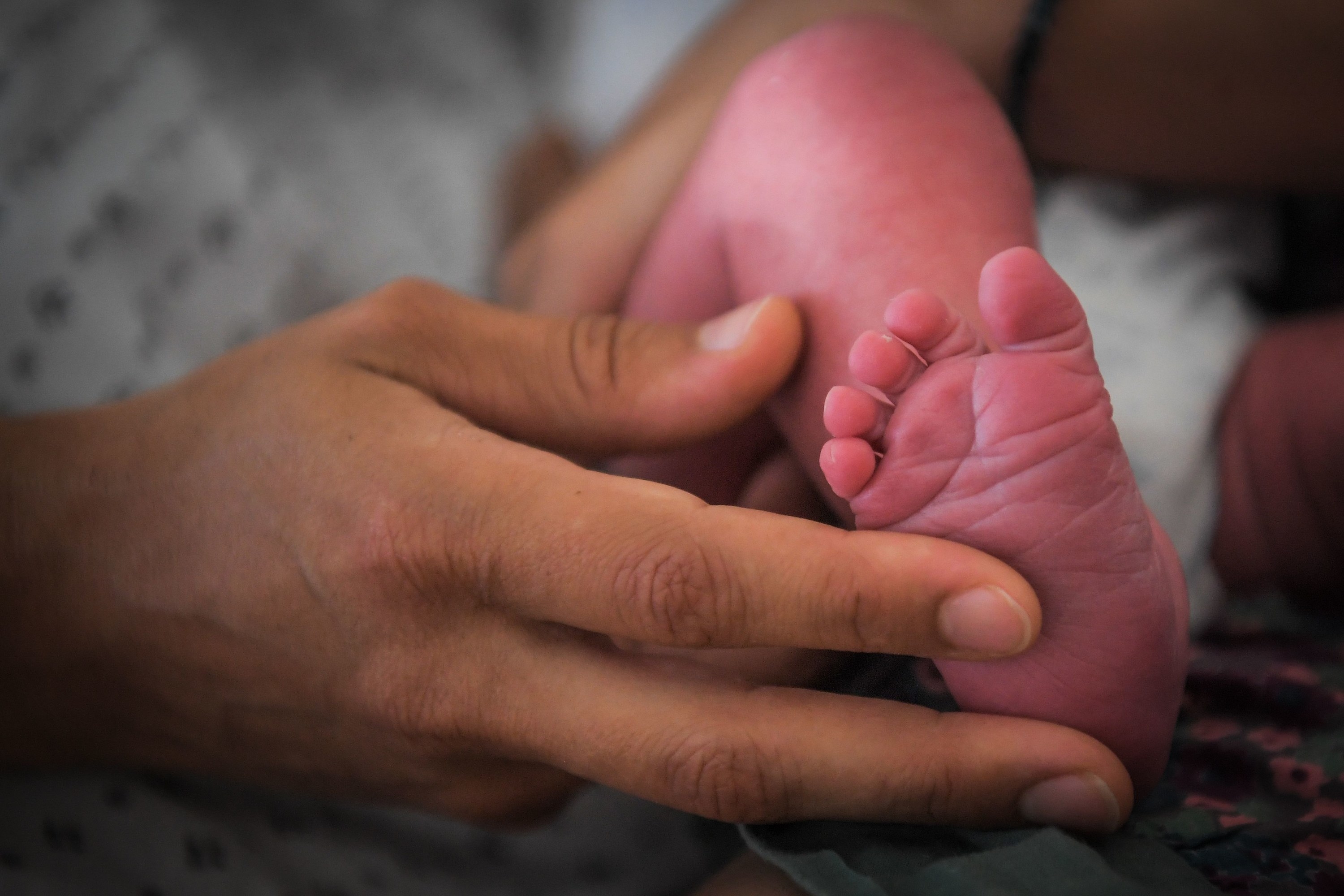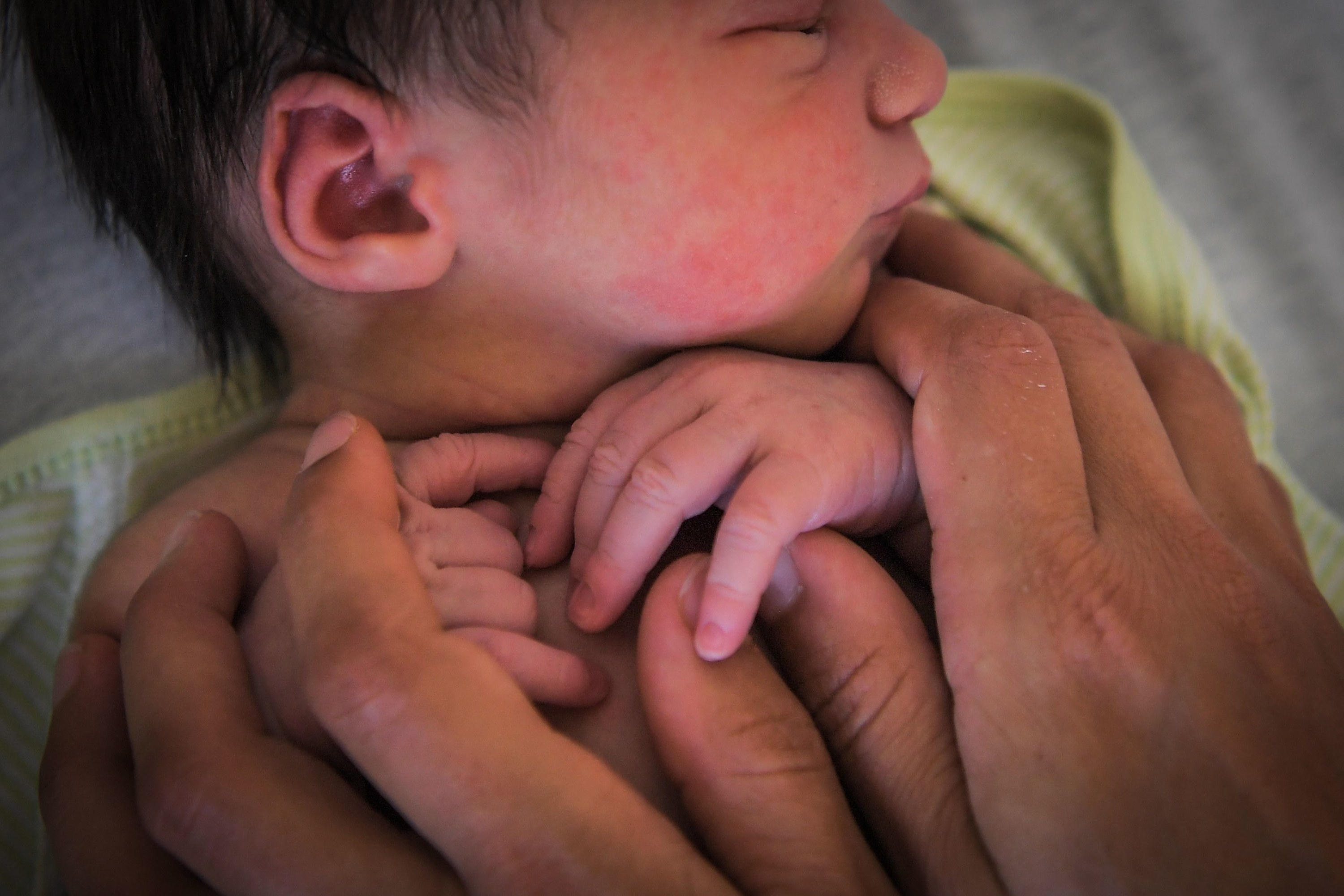
BuzzFeed News has reporters across five continents bringing you trustworthy stories about the impact of the coronavirus. To help keep this news free, become a member and sign up for our newsletter, Outbreak Today.
“Thank you to the incredible community midwife team who cared for us throughout pregnancy and helped me deliver my beautiful baby boy at home; it is a very strange time but their care has been wonderful.”
This entry in a card is one of many messages of heartfelt thanks received by midwives at South Warwickshire NHS trust since the coronavirus crisis began.
When the pandemic hit the UK, many hospital trusts promptly decided to suspend home births, leaving hundreds of pregnant people deeply disappointed. But some trusts have been doing things very differently; not only have they kept the service in place but they’ve actively encouraged more people to give birth at home during the pandemic. Increasing numbers of those now deciding to stay away from hospital and make sure their partners can be by their side.
Sarah Noble, head of midwifery at South Warwickshire, told BuzzFeed News that around half of all births that were planned for the midwife-led unit attached to Warwick Hospital were now taking place at home — a huge increase from last year. Only a tiny fraction of births at the trust usually happen at home; last year they accounted for only 0.46% of all births.
But Noble said there had been a huge increase since the service had been promoted by community midwives and on social media — last year only around two people booked to have a home birth each month, yet 20 have been booked for April and 38 for May this year.

Noble, who has previously worked in military hospitals, said a “normal and typical response” to a crisis was to ”pull everything to centre”. She said there was an assumption in her profession that because the “critical core function” was one-to-one care, then that should happen on the labour ward.
“But I thought actually we should be able to support choice in whichever setting women choose that one-to-one care,” she said. “Because we know, in terms of evidence for safer outcomes, that if you have a straightforward pregnancy your outcomes are much better if you birth at home or in a midwife-led unit."
Noble said the team had been deluged with messages from grateful new parents, which had hugely boosted morale among the midwives during a difficult time for the NHS. One family wrote to say how strange it had been to see their midwife wearing personal protective equipment, but “warmth and empathy” had radiated from her and “they were able to see the smile through the mask”.
Abigail Holmes, a consultant midwife at Cardiff and Vale University Health Board, said they had also overseen a big increase in home births in recent weeks. In April 2019, there were just 4 planned home births in the area (1% of all births) and this April there were 26 (6%).
“There’s been a huge increase in home births which has been just wonderful,” Holmes told the Maternity and Midwifery Hour podcast. “We talk about home births all the time and we try to encourage home births as much as we can, but our rates did remain low, below 1%. Suddenly we’re seeing this huge increase.”
Holmes said she now offered a virtual home birth assessment. “If a lady had planned to have her baby at home from the onset of her pregnancy then it’s normally a brief conversation,” she said. “If a lady’s option has changed in the light of COVID we just explore that a little more. I do a virtual assessment of her home environment to look at the logistics.”
BuzzFeed News reported last month how families across the UK were preparing for the kinds of birth they didn’t want: how home births and water births had been suspended, partners were banned from scans and only allowed in hospital for a few hours during active labour, and families were worrying about who would care for older siblings during labour in the absence of shielding grandparents.
One woman told then how she was desperately worried her local trust would suspend home births: “We’ve done so much research around what’s important for the easiest, least invasive labour; environment is so important, fear will prevent you from having an easy birth.”
Noble said it made sense that many more people were choosing home births given their anxiety levels during the pandemic: “They were among the first groups to be asked to socially isolate and distance — if they’re low risk, why bring them in if they don’t need to be brought in?”

Noble first made sure that the local ambulance service in Warwickshire was on board with her plan to promote home births. “It was about looking at the numbers: what is the transfer rate, what number of those transfers are actually life-threatening?” she said.
“Often you get two ambulances arriving at a home birth — one for mum and one for baby — but actually if you’ve got a baby that’s been born well and you just need one because mum is bleeding you should be able to stand down that ambulance. Also the vast majority of transfers are for nonurgent reasons — labour has slowed down, maybe the baby is in a funny position early in labour and mum would rather have a breech birth in hospital — actually you could get partners to drive the women in. That’s an appropriate use of resources and massively reduces the ask for the ambulance service.”
Noble said her team of midwives had been in a good position ahead of the pandemic because they had a much higher proportion of staff in the community (some 40%). “We made a conscious decision not to staff buildings but to wrap care around women,” she said. “The staff are there to follow the women.”
Everyone who books to give birth at Warwick Hospital is given a named midwife who should provide 90% of all antenatal appointments and 75% of postnatal appointments and should be there for the birth if possible.
Asked what she made of NHS trusts which had suspended home births, Noble said: “Pre-COVID, there’s never needed to be that national transparency around differences in services. The differences have always been there but we’ve probably never had a crisis like this that has united the country around one common interest, so it’s really obvious and has shown a spotlight on those seeming inconsistencies.
“But 30 miles up the road from where I am, the head of midwifery there is facing very different challenges to me because there is a much, much higher prevalence of cases and also her staff group are very different so there is a much higher percentage of staff sickness.
“I think from an NHS point of view, there’s quite a lot of learning around operating in a crisis which we need to seize really — because there’s been so many innovations in the last three or four weeks that we need to keep carrying forward because they’re great innovations.”
NHS Greater Glasgow and Clyde is among many health boards and trusts which have paused home births during the crisis. A spokesperson told BuzzFeed News this decision had been taken “in line with revised arrangements for safe, effective maternity care across the whole of Scotland”.
“Our midwives have personally contacted all women who were booked in to have their baby at home to explain how this will affect them,” they said. “We are continually monitoring all of our services to ensure patients continue to receive the highest standards of care during this challenging time. We have every intention of re-introducing home births as soon as it is safe to do so.”
The Hillingdon Hospitals NHS Foundation Trust also suspended home births in late March — but restarted the service last week. "Home births are now once again available for expectant mothers who use Hillingdon Hospital’s services," a spokesperson said.
"As ever, midwives will work closely with women and families to help them give birth in the best and safest place for them. Admission to hospital may be necessary if COVID-19 is suspected. Our priority at all times is the safety of mother, baby, and our staff."
The Royal College of Midwives said it welcomed the continuation of home birth services where it was safe to do so. In its guidance to pregnant people, it said: “Because decisions are being made on a trust / board-by-trust / board basis, there is likely to be some inconsistency across the country in terms of the services provided.
“Some services are still able to maintain some level of home birth provision at this time, while others have made the difficult decision to suspend home birth services temporarily. Decisions to suspend home births are not taken lightly, but in the best interests of you and your baby.
“Services need to ensure that there are enough midwives and other staff to support you, wherever you are giving birth, and, in the case of home births, they also need to ensure that ambulance services are able to provide transfers should an emergency arise during the labour or birth.”
